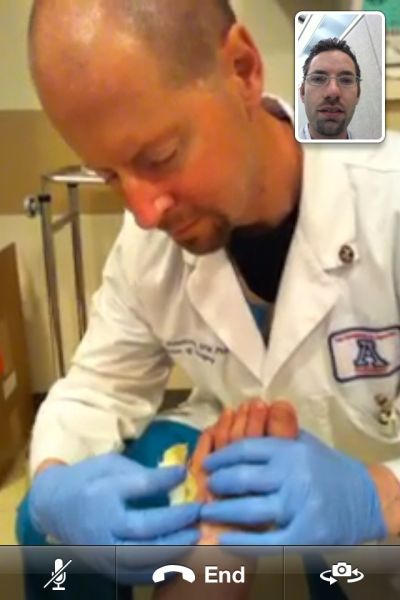The iPhone 4 videochat feature FaceTime may not be televising the revolution any time soon, but at least one pair of doctors have used it to consult on a patient who risked amputation.
In what may be the first documented iPhone 4 medical video consultation, University of Arizona surgeon David G. Armstrong, connected via FaceTime to give with Los Angeles Surgeon Lee Rogers’ a look at a patient who had undergone foot reconstruction at the University’s Southern Arizona Limb Salvage Alliance (SALSA). The virtual consult came in handy since Dr. Rogers was attending the American Diabetes Association meeting in Orlando, Florida when he took the “FaceTime” call from Armstrong, who had returned from Orlando to his SALSA clinics a day earlier.
Why did the two docs reach out using the iPhone 4?
“This really is a game changing tool,” said Armstrong, Professor of Surgery and SALSA director. “While the University of Arizona has had one of the world’s top tele-health systems, the ability to communicate quickly with something that is an afterthought has the potential to alter how we work with our colleagues and patients. Just as with the iPod in music and the laptop in computing, it is not the change in technology, but the change in form factor and ubiquity that alters this landscape.”
Decoded: like cousin the iPad, doctors are finding it easier and faster to use in a pinch. In California, a hospital started handing iPads out to staff, may also find equipping employees with the devices cheaper than dedicated hardware and software.
At Kaweah Delta Health Care District in Visalia, doctors and staff already use smart phones, including the iPhone, to access the hospital’s network. Over the weekend, the small group of doctors in a trial run were given iPads to keep abreast of patients, whether they are off site or in another wing of the hospital.
So, yeah, it’s nice to think that the iPhone’s FaceTime will be used for giving more than just good face, or other bits. Though in my experience the novelty of video calls — available outside the US for years — wears off faster than you can pretend the connection fell because whatever you’re doing, it’s not quite ready for primetime…


